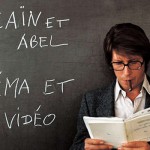Jean-Luc Godard
-
The Cinema is a Train: On Steven McQueen’s Hunger

The Cinema is the Train: Part One Economy of Narrative + Abundance of Truth = Poetry in Cinema In an earlier essay for Filmmaker, I argued that “…cinema’s ‘vocabulary of forms’ is typically under-utilized… While there are any number of cinematic languages that could exist, most of the time films tend to rely heavily upon what we could call the basics of film grammar – shot/counter-shot, close-ups, wide shots, over-the-shoulders and reverses, as well as certain editing paces and conventions of lighting and score,” and went on to praise Enter The Void for its progressive formalism. In keeping with Jean-Luc […]
by Zachary Wigon on Aug 24, 2011 -
MIA TRACHINGER, “REVERSION”

Three years ago Sundance played host to Mia Trachinger’s weird, beguiling take on the low-fi, sci-fi dystopia genre, Reversion. Odd, playful, melancholy and ultimately riveting, it bounced around the fest circuit for the past couple of years without finding a home with specialty distributors, perhaps a sign of just how ahead of its time it was. A couple of years later Sundance began its NEXT section, a category for films just like Reversion; adventurous, low budget mindbenders, genre deconstructions and idiosyncratic visions that SXSW would normally be the target destination for. Trachinger, whose Bunny was a success of the festival […]
by Brandon Harris on Jun 8, 2011 -
Fuller: On Great, Boring Movies and Cultural Vegetables

Unless you are a very serious basketball player — at minimum serious intramural league level, or one of those Wall Street guys who absolutely must blow off a ton of steam by playing their hearts out on the court or else they’ll absolutely lose their soul — there is a very distinct qualitative difference between what it feels like to play basketball for a while and to run for a while. After you finish playing basketball for a while you feel good, you’ve gotten some good cardio, but that cardio is intermittent, the game being filled with plenty of pauses […]
by Zachary Wigon on Jun 7, 2011 -
Jean-Luc Godard’s Schick Commercial

Here’s something I didn’t know: Jean-Luc Godard once did a Schick commerical. Nicholas Rombes writes about it over at the Rumpus in his Art Film Roundup: Schick was owned by ultra-Conservative, capitalist extraordinaire Patrick Frawley. Does this matter, that Godard made a commercial to help sell products for a company whose profits supported political causes antithetical to his own? We are all complicit in these hypocrisies, small and large, as we use and consume objects each day whose sources in the global matrix are often obscure. If Godard made the commercial to help fund his more radical projects (perhaps Tout […]
by Scott Macaulay on Feb 10, 2011 -
“I See No Difference Between the Two”: On Cinema’s Role in Society
by Zachary Wigon on Jan 24, 2011
“I see no difference between the two”: cinema’s role in society. By Zachary Wigon. -
TRAILER WATCH: ADAM PENDLETON’S “BAND”
Artist Adam Pendleton has created a new large-scale video installation at New York’s The Kitchen inspired by Jean-Luc Godard’s Rolling Stones’ deconstruction, Sympathy for the Devil. It features the band Deerhoof and runs through December 23. From the catalog copy: This solo exhibition presents the U.S. premiere of Adam Pendleton’s new large scale video installation. Pendleton’s BAND is a form and content refashioning of Jean-Luc Godard’s Sympathy for the Devil, which stands in open contrast to the earlier film. Modeling Godard’s belief that radical formal complexity can undermine the bourgeois logic implicit to narrative filmmaking, BAND tracks the indie-rock band […]
by Scott Macaulay on Nov 27, 2010 -
FILMMAKER FLASHBACK: FALL, 1994
Steve James’ Hoop Dreams, Darnell Martin’s first feature, I Like it Like That, experimental filmmaker Eric Saks, and a report on non-linear editing, which was new at the time — those were all in our Fall, 1994 edition. But our big story was our cover — Hal Hartley’s interview of Jean-Luc Godard. Godard was in town for an exhibition of his work, including his new “self-portrait,” JLG BY JLG. Hartley met with Godard at 9:00AM in his suite at the Essex Hotel, and d.p. and photographer Gabor Szitanyi snapped the smoky shot of Godard we ran. Nothing from this issue […]
by Scott Macaulay on Aug 10, 2010 -
“MAN WITH A MOVIE CAMERA” AT STRANGER THAN FICTION
Since part of the mission of Stranger Than Fiction is to promote “lost gems,” it should come as no surprise that programmer Thom Powers would choose to screen Dziga Vertov’s Man With A Movie Camera, a little seen (outside of film schools) Soviet classic that has had a profound influence on everything from Jean-Luc Godard to car commercials. A mish-mash of documentary material and visual effects, Man With a Movie Camera is a rapidly edited documentary experiment — and perhaps the world’s first music video. Last night’s screening featured a modern score arranged by John Walter, an editor and filmmaker […]
by Mary Anderson Casavant on May 26, 2010 -
NEW GODARD (REALLY)
It’ not everyday that I can stream in its entirety a new film by Jean-Luc Godard on the website. Okay, I don’t know for sure that the teaser trailer for Godard’s forthcoming Socialism is the whole film, albeit sped-up, but I imagine it is. From a blog called Radio Deleuze comes what seems to be a synopsis: A symphony in three movements. Things such as: The Mediterranean, a cruise ship. Numerous conversations, in numerous languages, between the passengers, almost all of whom are on holiday… An old man, a war criminal (German, French, American we don?t know) accompanied by his […]
by Scott Macaulay on Mar 18, 2010 -
John Walter, Theater Of War
MERYL STREEP IN DIRECTOR JOHN WALTER’S DOCUMENTARY THEATER OF WAR. COURTESY WHITE BUFFALO ENTERTAINMENT. In the field of documentary, John Walter has emerged as the medium’s most eloquent and entertaining cultural historian. The Detroit-born director, who is also an unpublished poet, began his career in the film industry as a boom operator and worked in that capacity on Sam Raimi’s Evil Dead II. In the mid 90s, he became an editor, beginning with Norman Reedus’ Messenger (1994), and in 1995 he directed Edison’s Miracle of Light, an episode of PBS’ television series The American Experience. In 2002, Walter made his […]
by Nick Dawson on Dec 24, 2008
